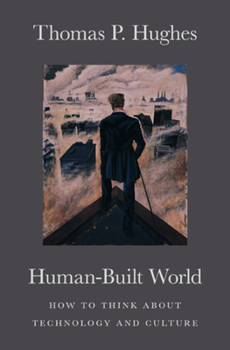Human-Built World: How to Think about Technology and Culture
Select Format
Select Condition 
Book Overview
To most people, technology has been reduced to computers, consumer goods, and military weapons; we speak of "technological progress" in terms of RAM and CD-ROMs and the flatness of our television screens. In Human-Built World, thankfully, Thomas Hughes restores to technology the conceptual richness and depth it deserves by chronicling the ideas about technology expressed by influential Western thinkers who not only understood its multifaceted...
Format:Paperback
Language:English
ISBN:0226359344
ISBN13:9780226359342
Release Date:May 2005
Publisher:University of Chicago Press
Length:240 Pages
Weight:0.65 lbs.
Dimensions:0.7" x 5.5" x 8.2"
Customer Reviews
2 ratings
An excellent, concise review
Published by Thriftbooks.com User , 14 years ago
The Human-Built world is a wonderfully concise rendering, in both theme and prose, of the history and role of technology in the West, particularly the U.S., whilst losing very little explanatory power. Hughes starts with the philosophic impetus for technology in ancient literature (Cicero) and Christian theology. The first saw in man's nature an urge to develop a "second creation"; the latter sought the recovery of Eden. In Goethe's Faust, a second creation is a manifestation of man's creativity and egotism, a challenge to God. In founding America, the Puritans saw themselves as a moral beacon for the rest of the world, "a Citty upon a Hill". In Chapters Two to Four, Hughes traces the development of technology from the machine revolution of the 19th century to the systems and control revolution of the 20th century to the current information revolution: each not only created something new but also re-conceptualized things and men. In the final two chapters, technology's impact, culturally and environmentally, is discussed. The message here is the need to reign in technology; its pervasiveness and power can have a detrimental influence on culture and the environment. Hughes also indulges in a few quick and incisive comments along the way. The Europeans did not uniquely transform North America, the Indians also controlled their environment (p. 7); on the arms race: "Unfortunately, many Americans today find spectacular energy laden weaponry sublime" (p. 39). Also helpful is the bibliographic essay, which I've used to find further reading. This little book is a dynamo of information and insight. It's highly recommended.
Moving technology to the forefront of history
Published by Thriftbooks.com User , 16 years ago
Thomas Parker Hughes, scholar, professor, and author, has dedicated himself "to better [understanding] the complexity of technology and its multiple uses."(1) Hughes believes Americans construe technology too broadly. In "Human-Built World" Hughes defines technology "as a mode of creation"(177) and he expands on the theme that "humans have been engaged in creating a living and working place."(179) Technology is the main thread in his history, but technology does not determine history's course. For better or worse that is left to society. Particularly in relation to the environment, Hughes concedes the century of technological enthusiasm is in the beginning stage of deterioration. The human-built world is now in trouble, but society may respond appropriately and respond with an "ecotechnological" answer. According to Hughes "using technology to recover the Edonic state is a message entirely appropriate for our ecologically concerned times."(43) Society has to take on the responsibility, but whether technology's ecological legacy can be redressed, remains an open question. In Human-Built World Hughes observes that enthusiasm toward a technologically based world diminished between World War I and II. Hughes theorizes that the human-built world did not become a paradise is due more to "negative political and social values and structures, than to a failure in rational cooperation."(37) At a time when "artists and the concerned public have begun to doubt the completely human-built world can respond to human needs and aspirations," managing the systems-age is a "major societal challenge."(12) This tension Hughes hopes may be resolved in the "ecotechnological world."(152) Hughes is optimistic that technology can solve the problem; he is just not sure that society is technically literate enough to do it. Therefore one of Hughes' objectives is to increase the "technological literacy of Americans"(15); to inform and motivate people toward greater public participation to counter what he sees as the "the Burden" of technology.(168) Hughes is optimistic that a socio-technical systems answer may be the key to surmounting technology's negative legacy. With a clarity of purpose, Hughes frequently explains what he is doing, enabling the reader to follow his logic. His tone and style of writing fits his audience and his purpose. Hughes' effort to make history more appealing to a wider audience is admirable. While Hughes wants "to move...[technology] from the periphery to toward the center stage of history,"(181) a technologically based future is uncertain. If society fails to rise to the challenge, the role of technology will remain at the periphery rather than on center stage.




